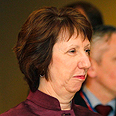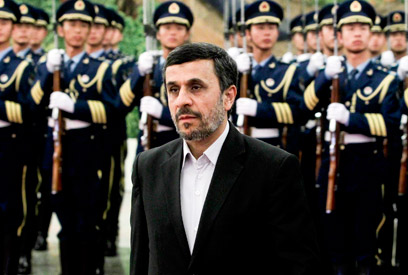
World powers start nuclear talks with Iran
Breakthrough in standoff over Iran's nukes unlikely, diplomats say, as six world powers kick off latest round of talks with Islamic Republic in Moscow
World powers began two days of talks with Iran on Monday to try to end a decade-long stand-off over Tehran's nuclear program and avert the threat of a new war in the Middle East.
Experts and diplomats say a breakthrough is unlikely, with Iran expected to demand recognition of its right to enrich uranium for what it says is a purely peaceful nuclear program.
Related articles:
- 'Secret war on Iran's nuclear program not working' Iran: About 20 arrested for nuclear scientist hits Ahmadinajad says to retire after 2013
The sides are no closer to agreement despite two rounds of negotiations since diplomacy over Iran's atomic program resumed in April after a 15-month hiatus.

Iranian President Ahmadinejad (Photo: EPA)
The nuclear-armed United States, Russia, China, France and Britain – plus Germany – will push Tehran over its enrichment of uranium to 20% fissile purity.
Such production represents a big technological advance towards making weapons-grade material.
The world powers are wary of letting diplomacy drag on without clear progress and giving Iran time to build up a program which they fear is aimed at developing weapons, although Tehran denies this.
"If Iran remains unwilling to take the opportunities these talks present, it will face continuing and intensified pressure and isolation," a Western official said.
That would mean more sanctions from the West, although not the United Nations Security Council because veto-holding China and Russia oppose further punitive measures. It could also mean the threat of Israeli force growing.
Israel talks tough
New US and European Union sanctions are due to come into force in two weeks, tightening economic pressure on Iran.
But without progress to ensure Iran does not develop nuclear arms, Israel "could find itself facing the dilemma of 'a bomb, or to bomb'," Minister for Strategic Affairs Moshe Ya'alon said on Sunday.
"Should that be the choice, then bombing (Iran) is preferable to a bomb (in Iran's hands)," he said. "I hope we do not face that dilemma."
The six powers – led by EU foreign policy chief Catherine Ashton – hope at least to win assurances that Tehran is willing to discuss concrete solutions, opening the way to progress.
"Ashton is willing to stay in Moscow as long as it takes," a senior EU diplomat said. "But there is a time limit also ... We will have to say 'no' to talks for talks' sake."
The six nations want a substantive response to their offer of fuel supplies for a research reactor and relief in sanctions on the sale of commercial aircraft parts to Iran.
'Diamonds for peanuts'
At the last talks, in Baghdad last month, they asked Tehran in return to stop producing higher-grade uranium, ship any stockpile out of the country and close down the underground Fordow facility where such work is done.
But Iran's chief negotiator, Saeed Jalili, has indicated the incentives on offer are insufficient.
A former Iranian negotiator, Hossein Mousavian, likened the powers' proposal to swapping "diamonds for peanuts", telling Reuters that the Moscow talks would probably fail without substantial concessions by the six powers.
Iran is also seeking an end to increasingly tough economic sanctions which have in recent months directly targeted its ability to export oil, its economic lifeblood.
But international concern is growing. The International Atomic Energy Agency (IAEA) failed to persuade Iran, in talks this month, to let it inspect the Parchin military site where it suspects nuclear bomb-related research took place.
- Receive Ynetnews updates directly to your desktop










